Rieder’s Richter Scale: Maggie MacNeil Pulls Off Upset of All Upsets
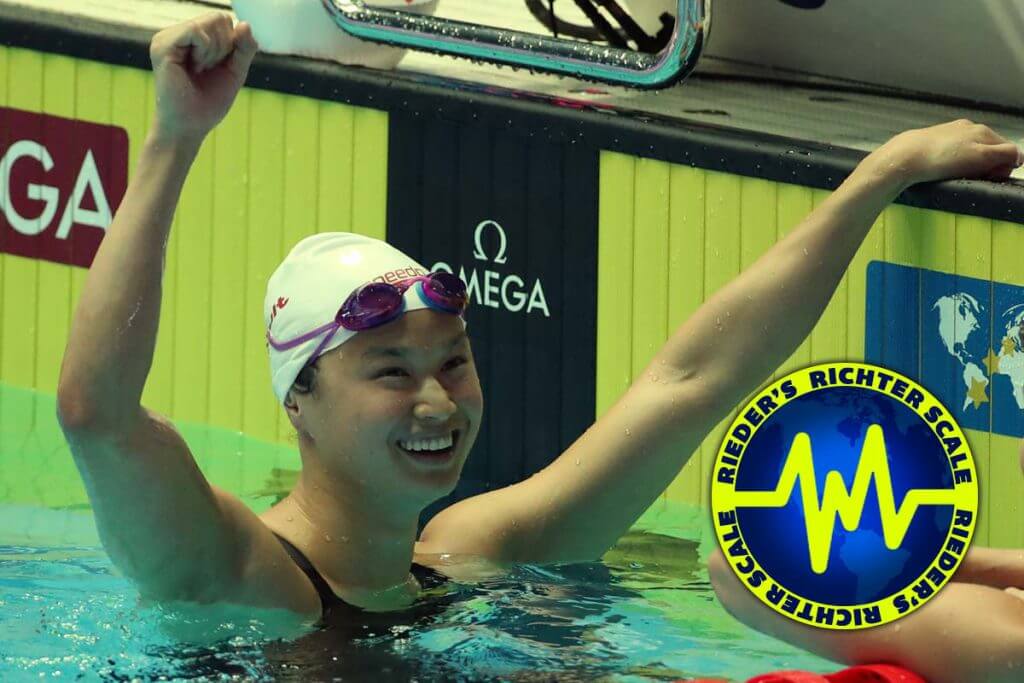
Editorial content for the 2019 World Championships coverage is sponsored by FORM Swim Goggles.
See full event coverage.
Follow FORM on Instagram at @FORMSwim #swimwithform

Each day during the FINA World Swimming Championships, Swimming World will present “Rieder’s Richter Scale,” an analysis of the impact of each swimming final on the sport’s wider landscape: “1” indicates just a minor tremor, while a “10” means a race brought massive upheaval. Maggie MacNeil
Ten years ago, when Sarah Sjostrom won her first world title in the 100 fly, she started out slowly, turned in seventh place at the halfway point before roaring home for the first major gold of the 15-year-old’s now legendary career. Tonight in Gwangju, 19-year-old Canadian Maggie MacNeil turned fifth at 50 meters—and then pulled off the exact same feat.
Back in 2009 in Rome, Sjostrom had already established herself as the headliner via a stunning world record in the semifinal. Fast forward a decade, and MacNeil had pulled off a nice qualifying swim as well with a 56.52, but that still seemed like nowhere close to Sjostrom territory.
That’s because going into the final, Sjostrom owned history’s 11 quickest performances in the women’s 100 fly. Her world record stood at 55.48, with Dana Vollmer the only other woman to ever break 56 all the way back in 2012. The next-fastest lifetime best in the Gwangju final belonged to Emma McKeon at 56.18.
Conventional wisdom spoke that no woman was coming close to Sjostrom in the event she has dominated since 2013. This wasn’t like Katie Ledecky in the 400 free, where Ariarne Titmus had been steadily closing the gap and figured to pose a threat should Ledecky falter.
For 50 meters of the Gwangju final, conventional wisdom held. Sjostrom went out in 25.96, five hundredths under her own world-record pace. Kelsi Dahlia and McKeon, who joined Sjostrom on the podium at the World Championships in Budapest, were closest to her. MacNeil was fifth, not even in the picture at 26.77.
But off the turn, as the swimmers popped up from their underwater dolphin kicks, MacNeil materialized right next to Sjostrom. She had the acceleration, she had the momentum, and by the last 15 meters, Sjostrom was gassed.
MacNeil clocked in at 29.06 for her homecoming split, the fastest in history—just ahead of the 29.12 Sjostrom swam with the aid of a polyurethane bodysuit at those World Championships a decade ago.
Just like day one, when Titmus took down Ledecky in the 400 free, a surreal feeling grasped the World Championships. Only this was even more of an out-of-nowhere shock because MacNeil entered the year with a 100 fly lifetime best of 58.44. She entered the meet with a 57.04 from Canada’s Nationals in April.
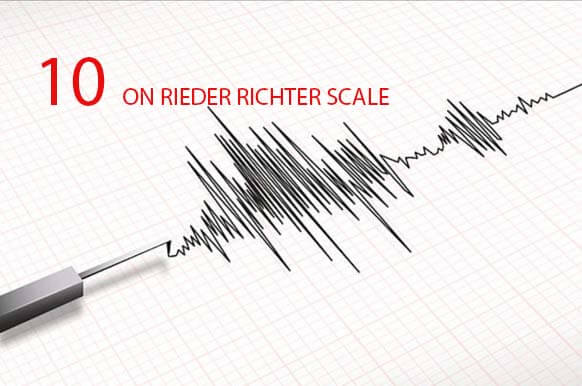
Now, in 55.83 seconds, MacNeil is the second-fastest swimmer in history. “I can’t even fathom it right now,” MacNeil told NBC Sports in a post-race television interview.
Whereas Titmus earned a 9 on the Richter scale, MacNeil gets the week’s first 10.
And then, during the medal ceremony, came the heartwarming moment afterwards during the medal ceremony, when all three medalists wrote words of encouragement on their hands for Rikako Ikee, the Japanese teenager currently recovering from leukemia. One of those beautiful moments sports can provide. Bravo.
If Adam Peaty had waited until the final to complete “Project 56,” that probably earns a Richter reading of a higher magnitude than what the 100 breast final will get. Not for Peaty’s lack of trying, though—he went out hard in his 100 breast final, his 26.60 split three hundredths faster than his world-record split from Sunday and just nine hundredths slower than his own 50 breast winning time from the 2015 edition of the World Championships.
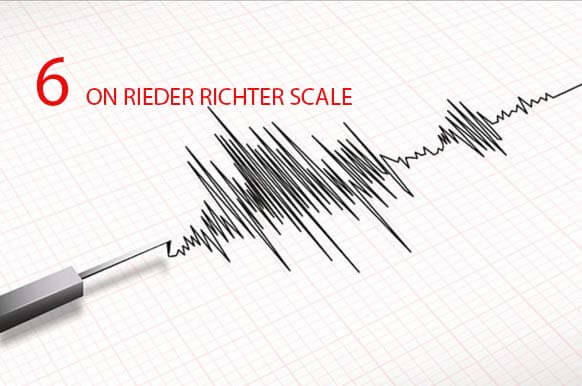
Alas, in the final, he had to settle for the fourth-fastest time in history, behind his world record and his winning times from the 2018 European and 2016 Olympic finals, and a banner moment for British Swimming with a 1-2 finish.
James Wilby and Yan Zibei, who captured silver and bronze, respectively, were among the top contenders for minor medals coming into the meet, as was Belarus’ Ilya Shymanovich, who provided the event’s only real shock when he flamed out in the semis. After the drama of Sunday evening, the final was something of a letdown, but this race still records a 6 on the scale.
Few of the non-Olympic 50 races will result in high-impact seismic activity, and that was most of the story of the men’s 50 fly. Caeleb Dressel picked up gold medal No. 2 with a winning margin of 0.35, basically a blowout in a race as short as 50 meters. If nothing else, his fly is on point, and that means Michael Phelps’ 100 fly world record, the 49.82 from Rome 2009, is living on borrowed time.
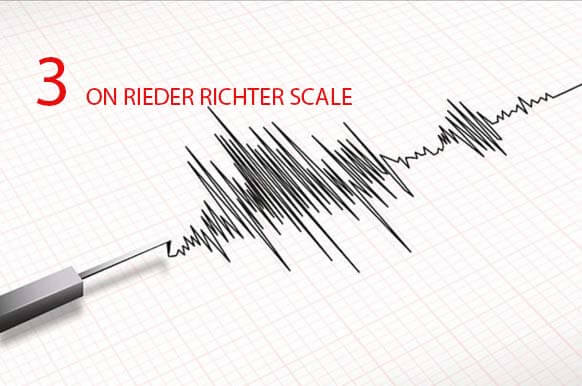
But what happened to the world record-holder and the reigning World Champion? Andrii Govorov, who swam a 22.27 last year, came in sixth at 22.91. Ben Proud, who finished on top of the podium in 2017, seventh in 23.01. That’s a poor sign for Proud’s 50 free coming up later in the week, even after he led the world last year in a textile-best time of 21.11.
Intriguing signs in the 50 fly, so this earns a Richter scale 3.
After two of history’s finest swimmers took their shots at a World Championships fourpeat and came up short, Katinka Hosszu finally delivered in the 200 IM… with her slowest time of the three rounds, 2:07.53, but plenty to get the job done.
Behind Hosszu, Ye Shiwen’s silver was the first major medal for the 23-year-old since winning gold in the 200 IM at the 2011 World Championships and gold in both IMs at the London Olympics—a comeback few pegged coming into the year. Behind her, Sydney Pickrem posted a nice swim to earn bronze after a water-choking mishap doomed her medal chances in this event two years ago.
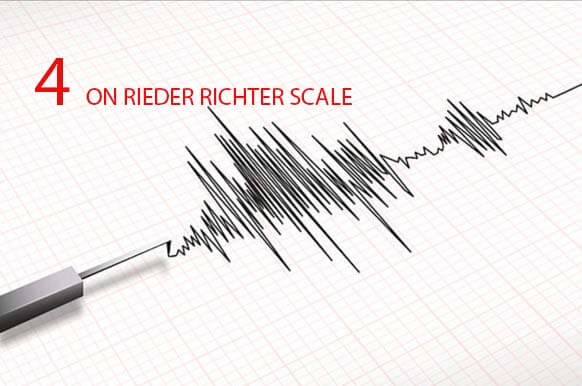
And for American Melanie Margalis, fourth again. She was fourth at the Rio Olympics, albeit in a very strong time of 2:09.21 that left her far from disappointed. A year later in Budapest, she finished fourth, her time there a 2:09.82 that was more than a second slower than her semifinal effort. This time, Margalis should find consolation in her effort, a 2:08.91 that marked the fastest time that has ever missed make the podium in the 200 IM.
Even with that said, three swimmers swam quicker times in 2018 than Ye’s silver medal-winning time. Yui Ohashi at 2:08.16, Kathleen Baker at 2:08.32 and Kim Seoyeong at 2:08.34. So this event has room to grow—with slim but existent chances at encroaching on Hosszu territory—as Tokyo 2020 beckons.
For Gwangju, the women’s 200 IM checks in with a 4.
That backstroke starting platform situation: Yikes. The platforms failed at an alarming rate in prelims, resulting in multiple re-swims and 18 swimmers competing in the men’s 100 back semifinals. Two hours before finals, the platforms were ruled out for the session, only to be brought back at the last minute with only one setting allowed after massive uproar.
Kathleen Baker, the world record-holder in the women’s 100 back and No. 4 qualifier for Tuesday’s final, chimed in.
“When I heard that there weren’t going to be any, I think my heart rate was like 300,” Baker said. “I mean, that ledge is huge for backstrokers. It’s not just about having a better start, but it’s about not slipping and issues like that, and taking that stress away with the wedge is amazing. And then hearing that we might not be able to was very anxiety-producing I think for every backstroker here.”
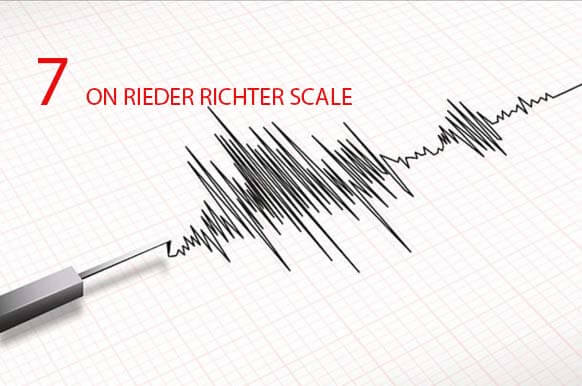
So sure, good for FINA getting the situation sorted out and not throwing months and years of preparing for backstroke starts off the ledge down the drain. But this sort of equipment failure shouldn’t be happening at the last minute, not at any local meet and certainly not at the World Championships.
Chaos. Uproar. Last-minute flip-flopping changes. That’s a 7 on the Richter scale.
Lastly for today, a look at a rough day two for Team USA. Dressel was the bright spot in the 50 fly, and fourth-place finishes for Melanie Margalis and for Michael Andrew in the 50 fly were fine. Andrew Wilson ended up sixth in the 100 breast, but he can’t be docked too much since his improvement in the semifinals has put the U.S. men’s 4×100 medley relay into a much less precarious situation.
But what happened to Kelsi Dahlia, who has been as quick as 56.44 in the 100 fly? She faded badly down the stretch in that final, ending up sixth in 57.11 with a 30.63 finishing split that was slowest in the field. What happened to Townley Haas and Andrew Seliskar, significant medal threats in the 200 free who both missed the final altogether?
Both will be counted on to improve significantly by the time the 4×200 free relay comes around Friday as the U.S. looks to avoid a third-straight World Championships defeat in that relay. Dahlia’s relative struggles combined with shaky results from Kathleen Baker and Olivia Smoliga in the 100 back semifinals (although they did qualify for the final) could spell trouble for U.S. women’s 4×100 medley relay.
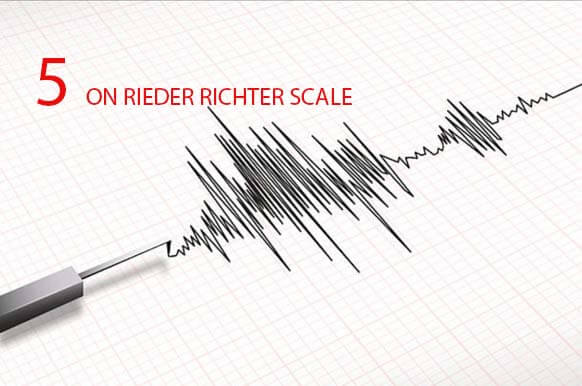
On the positive side, Ryan Murphy and Matt Grevers provided some assurance in the men’s 100 back semis, and they should earn at least one medal, possibly two and possibly gold, in the final. Lilly King always thrives in showdowns with Yuliya Efimova, and she has another coming up in the 100 breast final. And Katie Ledecky should bounce back to the golden step with the 1500 free final scheduled for Tuesday as well.
So there’s hope, and it’s early, with six days left in these World Championships. The seismograph isn’t going crazy just yet. Early struggles for the Stars and Stripes earn a 5.
Read more about the FINA World Swimming Championships.
.jpg)

- 2017 WORLD CHAMPIONSHIPS
- OFFICIAL MEET PAGE
- WATCH RACE VIDEOS
- LIVE STREAM
- DAY 1 SWIMMING RESULTS
- DAY 2 SWIMMING RESULTS
- DAY 3 SWIMMING RESULTS
- DAY 4 SWIMMING RESULTS
- DAY 5 SWIMMING REULTS
- DAY 6 SWIMMING RESULTS
- DAY 7 SWIMMING RESULTS
- DAY 8 SWIMMING RESULTS
- RESULTS FOR ALL AQUATIC SPORTS
- DAY 8 PRELIMS HEAT SHEETS
- DAY 8 FINALS START LISTS
- FORM Swim for Coaches
- FORM Swim Sponsorships
- FORM Swim Contests
- FORM Swim Media



